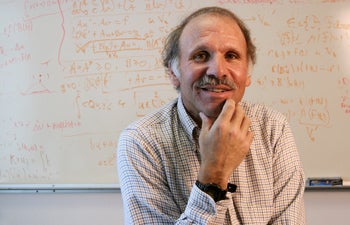Turning Data into Information
For Today’s Graduate, Just One Word: Statistics.
That headline in The New York Times says it best. Internet-age statisticians are finding themselves increasingly in demand, the recent article purports, even cool.
“I keep saying that the sexy job in the next 10 years will be statisticians,” Hal Varian, chief economist at Google, told The Times. “And I’m not kidding.”
The rising stature of statisticians, who can earn $125,000 at top companies in their first year after earning a doctorate, is a byproduct of the recent explosion of digital data, the article says, adding: In field after field, computing and the Web are creating new realms of data to explore — sensor signals, surveillance tapes, social network chatter, public records and more. And the digital data surge only promises to accelerate, rising fivefold by 2012, according to a projection by IDC, a research firm.
Gary Rosen has known this for quite some time. The professor and chair of the Department of Mathematics in USC College has worked with administrators and professors throughout the university to launch an interdisciplinary minor in statistics beginning in the spring. Based in the College, the minor consists of four classes: Math 307, Math 308 plus two approved classes with significant statistical content offered by any USC department.

Gary Rosen, professor and chair of the Department of Mathematics in USC College, worked with administrators and professors throughout the university to launch the interdisciplinary minor in statistics. Photo credit Philip Channing.
“There’s just an absolute explosion in the amount of data that we have at our disposal now because of the Internet and search engines,” Rosen said. “But it’s all useless unless someone can tease out the useful information. And statistics will let you do that.”
Statistics is the science of the collection, organization and interpretation of data. The minor is designed to be open to as broad an audience as possible. The prerequisite is minimal: credit for one semester of calculus or a score of 4 or 5 on an AP calculus exam.
Not only math, science and engineering majors would benefit from a statistics minor, Rosen said. Anthropology, archeology, economics, history, political science, psychology and journalism majors all use statistics to analyze research data. Business students who want to become CEOs would need statistics to evaluate goals such as what products will sell. Scientists searching for cures to diseases use statistics to locate patterns.
“It can enhance any major,” Rosen said. “For instance if you want to study sociology, if you’re the one sociologist who has statistical tools at your fingertips, you’re going to be more employable than the sociologist who doesn’t.”
The syllabus for Math 307 says: “This course should appeal to students majoring in business, life, physical and social sciences, and humanities, or anyone who has had one semester of elementary calculus who is interested in learning more about the theory and application of statistics.” The course consists of three hours of lecture and two hours of discussion, problem sessions and computer laboratory per week.
University Professor Michael Waterman, widely regarded as the founding father of computational biology, developed statistical and computation methods which were used in the sequencing of the human genome. Waterman co-developed the Smith-Waterman algorithm for gene and protein sequence comparison and the Lander-Waterman formulas for physical mapping and sequencing.
Asked which departments would benefit most from such a minor, the USC College scholar said, “It’s easier to ask which department wouldn’t.”
Waterman is USC Associates Chair in Natural Sciences and University Professor of Biological Sciences, Computer Science and Mathematics.
“In these days of massive data being accumulated at the blink of an eye, how to rationally think about and understand data is an extremely important matter,” Waterman said. “And it’s not something you’re born knowing how to do.”
For more information, contact Professor Charles Lanki at clanski@usc.edu or stop by the Math Department in Kaprielian Hall (KAP 104).